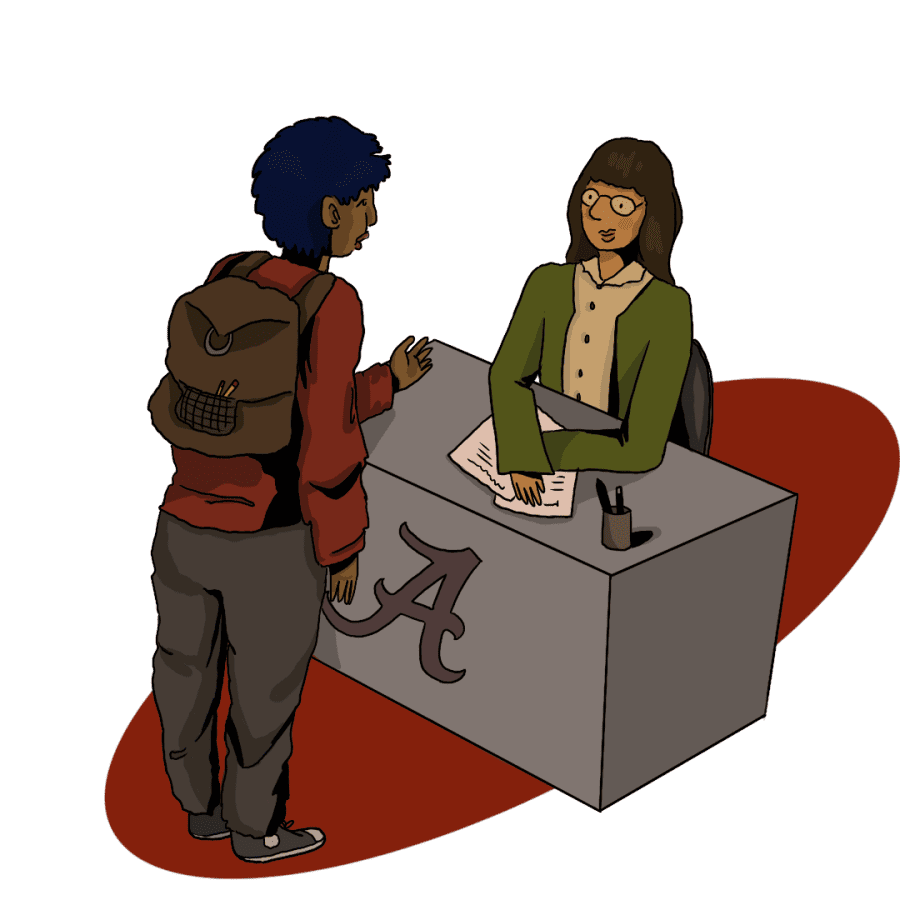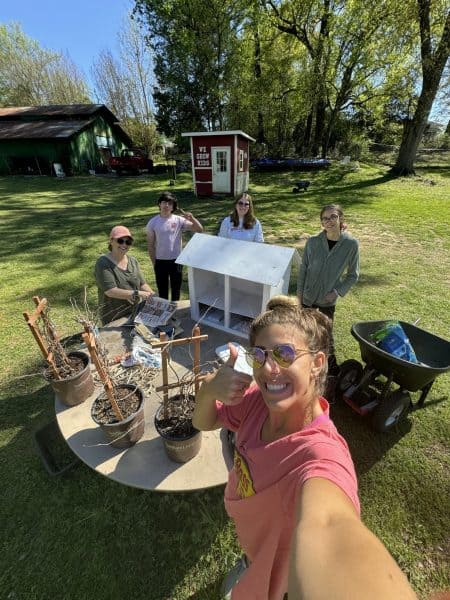A student’s guide to communication in the classroom
August 8, 2022
This fall, freshmen coming from near and far will venture to Tuscaloosa to begin their college journey. With new friends, housing and a campus to navigate, many students are too busy or too anxious to consider the importance of regularly communicating with their professors.
While the University has an abundance of academic support and resources for first-year students, it is up to students themselves to take ownership of their education and to seek help when they need it.
Jennifer Roth-Burnette, the director of the Learning Commons at the Capstone Center for Student Success, said the period between high school and college can be a stressful time for students.
“There’s definitely a learning curve because students are adjusting to all kinds of new, exciting and good things,” Roth-Burnette said. “There’s a whole lot of responsibilities that they’re taking on. And in addition to that, they have to be responsible for getting themselves to class and taking notes.”
Roth-Burnette said time management, self-direction and keeping up with fast-paced learning environments are common hurdles that students struggle to overcome during their first semester.
“In the classroom, you’re going to see differences in the syllabus,” Roth-Burnette said. “[Professors] are going to expect students to read and understand the syllabus first before asking questions. They expect a little more self-sufficiency.”
Roth-Burnette said many college classes determine final grades based off only a handful of assignments or exams, making it essential for students to seek out good relationships with their professors early on in the semester.
Communicating with professors early in the year is a good way for new students to take ownership of their learning and feel connected to their school.
Brooke Champagne, a senior instructor of English, said the biggest departure from high school is that the burden of communication now falls on both student and teacher.
“In this in this environment, it’s not like high school. You’re not going to have someone who necessarily checking to make sure you’re there. It’s on the students to do that,” Champagne said. “So that’s why it’s important that they make work to make that connection. It’s also the responsibility of professors to do that as well.”
Champagne said a student’s comfort level with their professors can be one of the factors that distinguishes student success from student failure, especially early on in one’s college career.
“Alabama is an enormous state school, and in the big picture, students probably feel like they are only a number of tens of thousands of students,” Champagne said. “A way to make them feel like they are an integral part of their own college experience is to know their teachers and know who they’re learning from.”
Despite this, in a survey done by Student Voice in May, 28% of college students say they never visit with their professors during office hours, and 55% only visit once or twice per semester.
Roth-Burnette said interacting with professors early on can give students an edge when applying to internships, graduate school and beyond.
“I’ll be honest, if I recognize a name, I have an immediate connection,” Roth-Burnette said. “I would love for every student to take that effort to get to know their faculty. Later on, [students] may be looking for faculty to recommend them for internships or to be references. Think of it as cultivating your network, because you really need to be doing that from the get-go.”
There is a lot of anxiety that can come with approaching a professor for help or asking a question in the middle of a huge lecture hall. Even reaching out to a professor one-on-one can be daunting for many students.
Roth-Burnette said she recommends being proactive and asking for help with a problem before it gets too big to handle.
“If you start to feel like you’re not sure about something or not sure how to do something, that is the moment to ask for help,” Roth-Burnette said. “There’s no shame in needing a little bit of guidance. We expect people to need that in a totally new environment.”
For many students, going to a professor’s office hours or speaking with them face-to-face about stressful academic subjects can be intimidating, making email, Zoom and other virtual options extremely useful tools for introverted students.
Jil Chambless, a senior instructor of mathematics, said email is one of the primary methods in which professors will reach out to students, making it a great option for students who are nervous about meeting face-to-face.
“These days, email is kind of going by the wayside, but it is a hugely important way for students to communicate. That way, they don’t necessarily have to see [professors] in person,” Chambless said. “Everybody is usually willing to jump on a Zoom, too, now that we all know how to do that.”
Champagne said reaching out with authenticity is the best place to start.
“I started noticing that students would, on the first day of class, get in this sweet little line to come introduce themselves to me,” Champagne said. “It’s a good time to do it early. I’m in the humanities, so it’s not just about scores. It’s about really getting to know individuals. [Being] more organic is key.”
Consistent conversations with professors will not only keep students in the loop, but will also point them in the direction of additional resources and tools that they may not be aware of.
From testing accommodations to assisting students with disabilities and full-service tutoring centers, there is an abundance of student resources available; all students have to do is ask.
Roth-Burnette said the Learning Commons at the Capstone Center for Student Success provides peer tutoring, peer coaching and much more year-round support, including preparation for graduate school entrance examinations, first-year transitioning and leadership programming, and study spaces.
“It’s a great resource. The [peer] tutors will help with subject-specific things like if you need help understanding a chemistry formula or you got a little lost in your math class,” Roth-Burnette said. “Peer coaching kind of addresses the other side of it. It’s the time management, figuring out how to talk to professors, taking good notes and things like that.”
Roth-Burnette said students relate better to other students, especially those who have already passed a class others are struggling with, making them the optimal choice to be tutors and coaches.
The Mathematics Learning and Technology Center, also known as the MLTC, is a lab and tutoring center open to any student looking for one-on-one tutoring, in person or online.
Chambless, who supervises all tutors in the MLTC, said the lab serves all math classes taken by freshmen and new students.
“People like me, instructors, graduate students in our department and professors who teach lower division courses, all of us act as tutors in our center,” Chambless said. “Drop in, no appointment. Come and sit and work, and then if you have a question, there’s somebody there to help you.”
Chambless said students don’t have to wait until they need help to visit the MLTC and that it is common to see students congregating to work on their homework together.
The Office of Disability Services (ODS) offers testing and learning accommodations upon request, a valuable resource that not every professor may advertise on their syllabi.
Champagne said students in need of learning accommodations should be on the lookout for information about the Office of Disability Services during syllabus week.
“Every one of my syllabi, for over the last decade and a half, all have had the ODS information on them. It’s something I definitely go over on the first day. That’s something that I’m not putting on students at all,” Champagne said. “Having talked to the ODS people who work there before, it seems that they’re under the impression that there is still a stigma in students admitting that they might need accommodations.”
Ultimately, the best way for any new student to succeed at The University of Alabama is to utilize the resources available and do what they can to cultivate good relationships with their instructors.
Chambless said students should read their syllabi in full and not hesitate to utilize the resources.
“Don’t wait until you have a problem,” Chambless said. “Don’t wait until you’re struggling. Don’t wait to seek help, get help as soon as you need it.”
Roth-Burnette also said she wants to see students taking advantage of the resources offered to them as they settle into life at The University of Alabama this fall.
“We are happy to have you here. We want to see you taking advantage of our resources. We only exist for you,” Roth-Burnette said. “Don’t let your anxiety get in the way of coming to see us in Russell Hall. I would say that about all the resources on campus, like the libraries and the Writing Center. Don’t hesitate to take advantage of what’s here for you.”
Champagne said, for new students, fostering relationships with friends and family and identifying a clear support system is just as important as fostering relationships with professors.
“Know what your support system is. Identify that and nurture that, whether that’s family or friends back home,” Champagne said. “It’s not all about academics, this is a time of really learning. Not the subjects you’re studying, but learning how to be yourself and what kind of person you want to be.”











